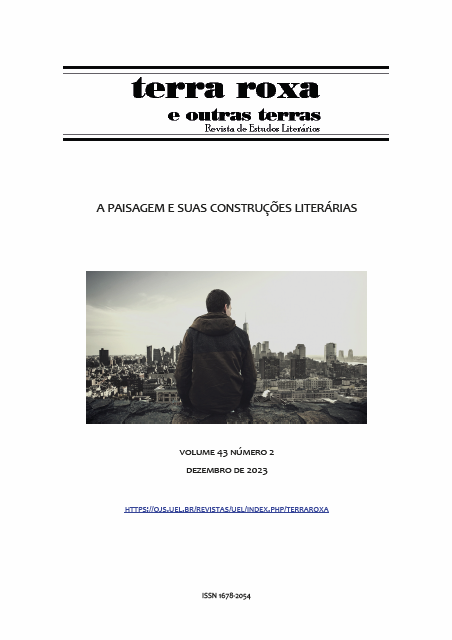Nature in a mirror labyrinth in A Desumanização, by Valter Hugo Mãe
DOI:
https://doi.org/10.5433/1678-2054.2023vol43n2p219Keywords:
A Desumanização, Valter Hugo Mãe, Poetic space, Poetic imaginationAbstract
The purpose of this essay is to examine how the nature of Iceland unfolds in the narrative of Halla, the protagonist of the novel A desumanização (2017) by the Portuguese writer Valter Hugo Mãe. In this mythical recreation, Iceland is metaphorically inscribed, assuming the role of a narrative character. Nature, in this context, serves as a mirror. As the narrative unfolds, nature and characters reflect each other, creating a labyrinthine effect that imparts poetic density to the text. Through the protagonist’s imagination, water, fire, earth, and air replicate and intertwine, forming images where the boundaries between reality and fantasy become indistinguishable. To analyze this mirrored construction, we primarily draw on the studies of Gaston Bachelard concerning space, imagination, and fire. Additionally, we incorporate Jorge Luís Borges’ reflections on the labyrinth concept. The primary objective of this article is to contribute to the critical reception of the author and the work by providing a critical exploration of the novel’s poetic space.
Downloads
References
BACHELARD, Gaston. A poética do espaço. São Paulo: Martins Fontes, 1993.
BACHELARD, Gaston. A psicanálise do fogo. São Paulo: Martins Fontes, 1994
BACHELARD, Gaston. A poética do devaneio. São Paulo: Martins Fontes, 2001.
BORGES, Jorge Luis. Laberinto / Labirinto. Poesia. Trad. Josely Vianna Batista. São Paulo: Companhia das Letras, 2009.
BORGES, Jorge Luis. Laberintos. Textos recobrados (1931-1955). Buenos Aires: Emecê, 2007
FARIAS, Ariane Avila Neto, Anderson Martins Pereira & Mariane Pereira Rocha. Islândia, a ilha do silêncio: o espaço melancólico de A desumanização, de Valter Hugo Mãe. Cadernos de Pós-Graduação em Letras, São Paulo, v. 18, n. 3, p. 177-188, 2018. Disponível em: https://editorarevistas.mackenzie.br/index.php/cpgl/article/view/11493. DOI: https://doi.org/10.5935/cadernosletras.v18n3p177-188
FREITAS, Angélica Catiane da Silva de. Sublime patético: a presença do trágico, do sublime e da melancolia nos romances de Valter Hugo Mãe. Curitiba: Appis, 2020.
MÃE, Valter Hugo, A desumanização. São Paulo: Globo, [2013], 2017.
PÁLSDÓTTIR, Anna Heioa. History, landscape and national identity: a comparative study of contemporary English and Icelandic literature for children. Tese (Doutorado em Comparative Literature) University College in association with Coventry University, Worcester, 2002. Disponível em: https://pureportal.coventry.ac.uk/files/41854003/P_lsd_ttir2002.pdf.
RITCHER, Marcela Wanglon, Poesia além da palavra. Anais do IX Seminário Internacional de História da Literatura, Porto Alegre, 2012. 945-960.
TEOTÔNIO, Rafaella Cristina Alves. Os fiordes da literatura: o duplo em A desumanização, de Valter Hugo Mãe. Revista Garrafa, Rio de Janeiro, n. 37, p. 87-97, 2016. Disponível em: https://revistas.ufrj.br/index.php/garrafa/article/view/4722.
Downloads
Published
How to Cite
Issue
Section
License
Copyright (c) 2023 Cinthia Limongi, Vera Bastazin

This work is licensed under a Creative Commons Attribution 4.0 International License.
Authors who publish in this journal agree to the following terms:
a) The authors retain the copyright and grant the journal the right of first publication, the work being simultaneously licensed under the Creative Commons Attribution-NonCommercial 4.0 International License, allowing the sharing of the work with acknowledgment of the authorship of the work and initial publication in this journal.
b) Authors are authorized to assume additional contracts separately, for non-exclusive distribution of the version of the work published in this journal (eg, publish in an institutional repository or as a book chapter), with acknowledgment of authorship and initial publication in this journal.
c) Authors are allowed and encouraged to publish and distribute their work online (e.g. in institutional repositories or on their personal page) after the editorial process, as this can generate productive changes as well as increase impact and citation of the published work (See The Effect of Open Access).
d) The authors of the approved works authorize the journal to, after publication, transfer their content for reproduction in content indexers, virtual libraries and the like.
e) The authors assume that the texts submitted for publication are of their original creation, taking full responsibility for their content in case of any objection by third parties.





















